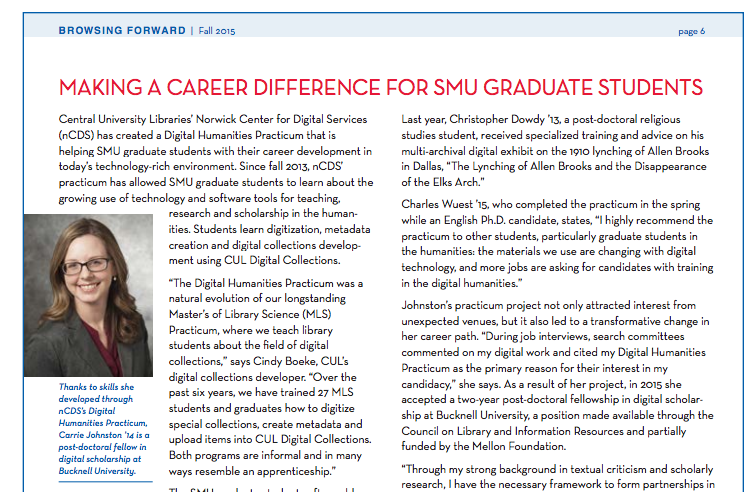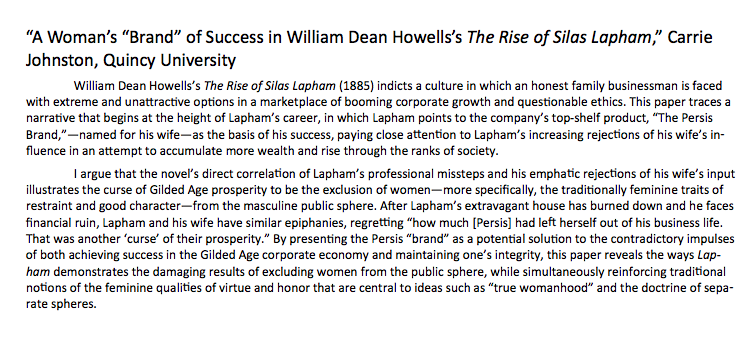The ZSR Library at Wake Forest hosts a fabulous lecture series featuring faculty research. I was honored to be invited to give a talk on my current research project that looks at the intersections of commercial culture and women’s literary labor in the U.S. Southwest in the late nineteenth and early twentieth centuries. The lecture committee films and archives all of the lectures, and here’s mine!
Author: carrielizjohnston
Acknowledgements
As I work on my book, I’m constantly reminded of the people that got the project off the ground. Unfortunately, the acknowledgements page in which I thanked these good folks is locked away in my embargoed dissertation. Here’s my digital solution to giving credit to all of my supportive and brilliant collaborators in a more public way. Thanks, everyone.
Acknowledgements, “Waiting, Writing, and Working Women of the Southwest”
Writing a dissertation is a group project. I am deeply grateful to those who gave so selflessly of their time to ensure the success of “Working, Waiting, and Writing Women of the Southwest.” My dissertation committee deserves thanks, praise, and lifelong indebtedness for the hours they spent working with me to brainstorm, draft, revise, and edit this dissertation. Many thanks to Dennis Foster who had faith in me, especially when I did not deserve it, and whose patience and insight saved the day at crucial moments. To Rajani Sudan, who asked all the right questions and suggested all the right theorists. Steven Weisenburger gave this project its edge when he suggested I look at the Fred Harvey Company in conjunction with New Mexico’s salon women. Sherry Smith’s research on southwestern writers and artists, plus her long-distance editing and feedback were indispensable at every stage of the project. For all of their extensive knowledge and superhuman editorial skills, I am thankful and humbled.
I had the good fortune of working with SMU’s DeGolyer Library and the Norwick Digital Center to create a digital humanities project, “Fred Harvey Co. Materials from the DeGolyer Library.” Sincere thanks to Cindy Boeke and the staff at the Digital Center, as well as Russell Martin and Pamalla Anderson at the DeGolyer Library for partnering with me to make Fred Harvey materials available online. In addition, archival work outside of SMU was made possible by SMU’s Clements Center for Southwestern Studies, the Charles Redd Center for Western Studies at Brigham Young University, and the South Central Modern Language Association.
There are countless people whose patience and support made this project a success. I am lucky to have ended up in such a collegial department for my graduate studies, and wish to thank Nina Schwartz and the English faculty for constant support. I am grateful to my cohort, Micah Robbins, Megan Schott, Fred Siegmund, and Michael Pueppke for their humor and good-natured feedback that made it possible to stay afloat during six long years of graduate school. With both nostalgia and thanks to Michael Anderson and Kelly Scanlon for the countless neighborly deeds—too many to list here. My family at Veritas, Brooks Anderson, Bradley Anderson, Fernando Garcia, Eddie Eakin, and Benjamin Verdooren, who were part of my writing process, although they may not have known it. Also to Tara Bixby, Brooke and Patrick Conley, Julia Callaway and Joe Madden, Paula and Noble Feldman, Joyce Nelson, Elizabeth and Brad Parsons, Elizabeth and Jeremy Hummert, Sarah Frances Scarborough, Minou and Alvin Olson, Kasey and Greg Thomason, and Leigh Anne West for your support, despite my extremely long absences in person and on the phone. I am grateful to my family, Terri and Roy Bailey; Paul Johnston; and Leah, Adam, and Amelia Payne, for being excited about absolutely everything, even when none of this made sense (which was quite often). And finally, to Charles Wuest, who makes me smart. Sincere thanks and love to you all.
What Do You Do with a DH Center?
Miriam Posner led a webinar I organized on DH Centers and thinking long-term about digital scholarship. Find a recording of the webinar here.
Browsing Forward: Making a Career Difference
SMU’s Browsing Forward Fall 2015 issue featured the ways my digital work at SMU has contributed to my current career path.
Student-Led Initiatives in Digital Scholarship
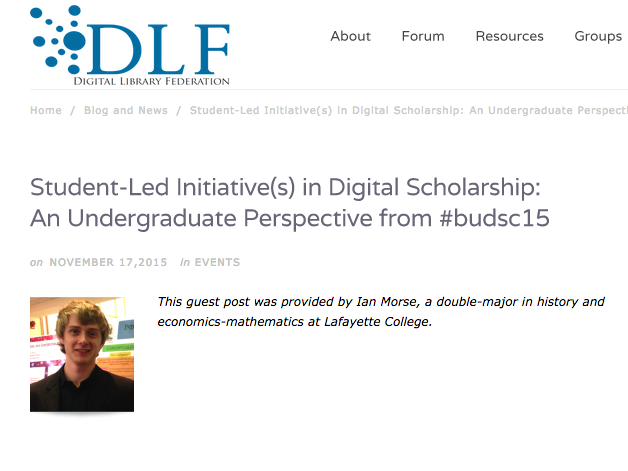
I’ve been happy to see a lot of good press about the #BUDSC15 conference that took place on Bucknell campus, Nov. 6-8, 2015. As one of the co-organizers of the event, I hoped that the conference would generate conversations about best practices for teaching and supporting students’ digital scholarship–conversations that actually involved those students working on collaborative digital projects. The conference was unique in that faculty and library staff presented their work in panels alongside student presentations, which did a lot to level out hierarchies that exist in most conferences.
The Digital Library Federation featured a post by one of the student presenters at #BUDSC15, Ian Morse of Lafayette College. The post was impressive and encouraging, as it shows that many of undergraduate students are willing to initiate their own research projects, and that they appreciate forums such as #BUDSC15 in which they receive feedback about and support for their work.
The Howellsian Newsletter

The Willam Dean Howells Society published abstracts of papers presented at the 2015 American Literature Association Annual Conference in their biannual newsletter, The Howellsian. The newsletter includes an abstract of my paper, “A Woman’s ‘Brand’ of Success in Howells’s The Rise of Silas Lapham,” which I gave on the Radical Howells panel.
NextPage newsletter, Nov. 2015
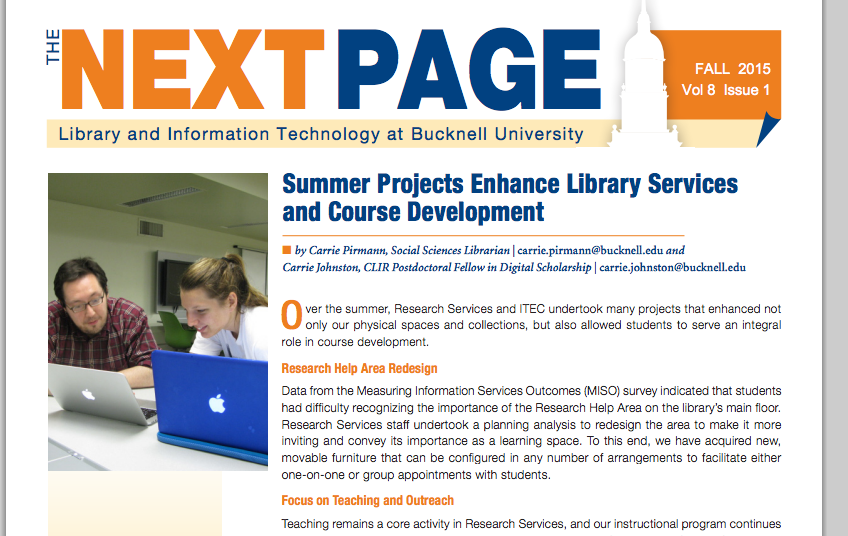
I co-wrote a piece for the Bucknell Library and IT newsletter, The NextPage, on the research projects that took place in L&IT over the summer. Click here for the full text.
Taking SMU Digital Collections with Me
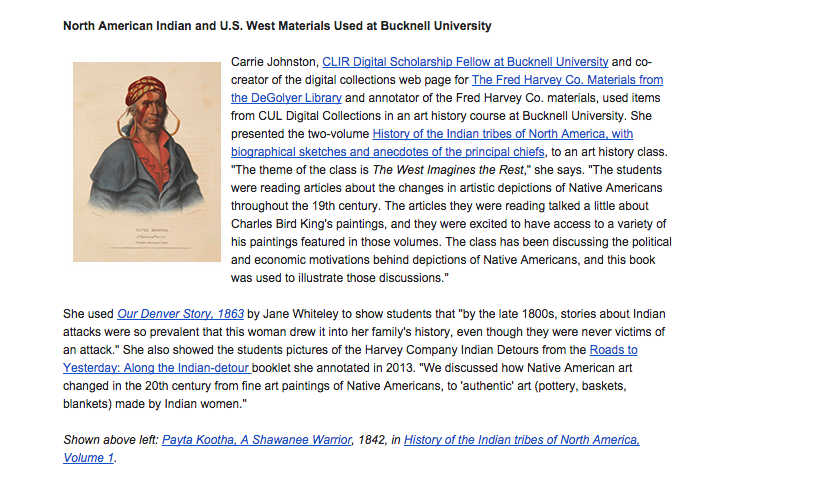
In a recent newsletter, the good people at SMU highlighted the ways I continue to use the digital collections I developed as a Ph.D. candidate. Most recently, I used these collections in a discussion in an art history class, “The West Images the Rest.” SMU has such a rich archive of rare materials, and I’m all for their mission to make these freely available and more accessible to the public.
Collaborating Digitally: Engaging Students in Public Scholarship
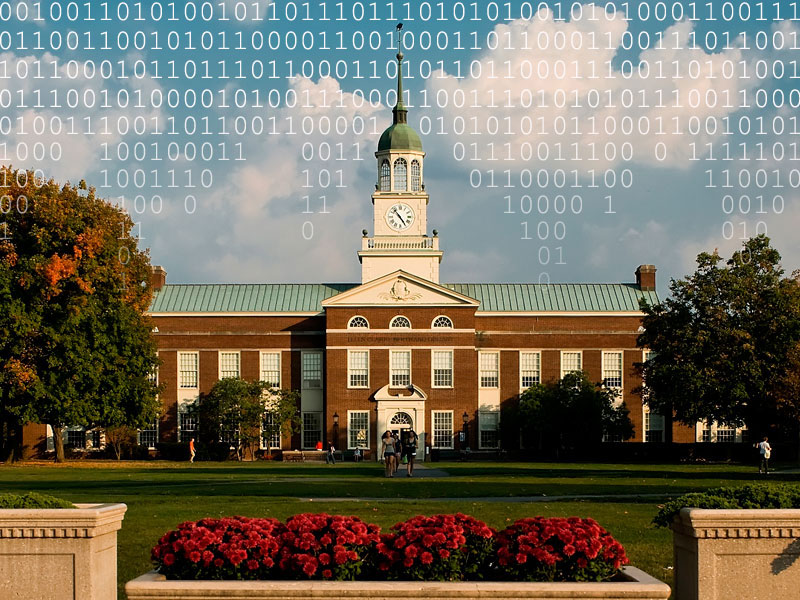
Here’s a great write up by Bucknell Communications about the Digital Scholarship Conference I am co-hosting Nov. 6-8. The Bucknell community is enthusiastic about the student-centered aspect of this conference. Not only are we featuring faculty and staff that are working closely with undergraduates to involve them in the research process, but many students are also presenting their own projects. To encourage student participation, we offered bursaries for student presenters this year and set up a NextGen plenary session to showcase student-directed research projects.
Second Annual Bucknell Digital Scholarship Conference
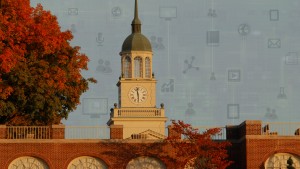
I am co-organzing a digital scholarship conference, “Collaborating Digitally: Engaging Students in Public Scholarship,” to be held Nov. 6-8 at Bucknell University. This year we have presenters from 50 institutions. Our keynote speaker, Micki Kauffman, is a doctoral student in the history department at The Graduate Center, CUNY and the Director of Information Systems at the Modern Language Association. The conference will also feature a NextGen Plenary session, where students will present the ways that their digital scholarship has intersected with the communities outside of the university.
